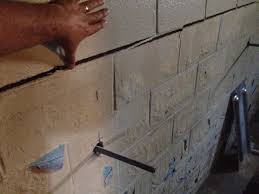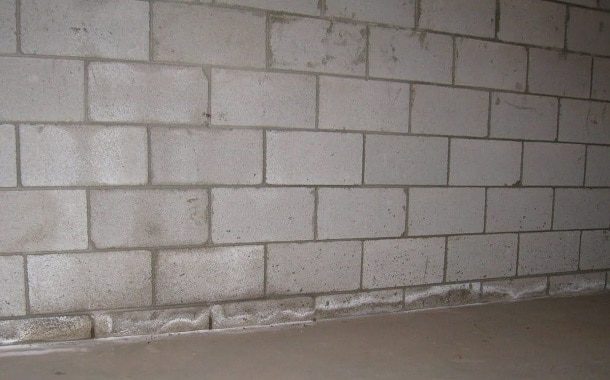How Much Does Block Foundation Repair Cost?
Last Updated on March 5, 2024
Written by CPA Alec Pow | Content Reviewed by ![]() CFA Alexander Popinker
CFA Alexander Popinker
Block foundations are a common choice for basement walls, providing strength and durability. However, over time, block foundations can develop cracks and other structural issues that require repair.
Repair costs vary significantly based on the extent of damage, type of repair needed, accessibility, local labor and material rates, and additional factors. Some minor repairs may cost a few hundred dollars, while extensive structural repairs can run into the tens of thousands.
How Much Does Block Foundation Repair Cost?
There are a variety of established repair techniques for stabilizing and restoring damaged block foundation walls. The ideal approach or combination of methods depends on the type and extent of damage present. Common repair options include:
- Epoxy injection – Special high-strength epoxy resins are injected under pressure into cracks and voids in the foundation. As the epoxy hardens, it bonds and seals the cracks for structural strengthening. Typical costs range from $300 to $800 per wall depending on crack extent.
- Carbon fiber reinforcement – Strips of durable, flexible carbon fiber fabric are bonded to the foundation walls using epoxy. This adds shear strength and protects against future cracking. Carbon fiber straps usually cost $150 to $200 per linear foot installed.
- Wall anchors – Externally installed steel rods or brackets are drilled and embedded into bowing or unstable walls to force them back into proper alignment. Anchors cost approximately $150 to $300 each depending on required load strength.
- Underpinning – A new foundation wall is constructed underneath the old block foundation and connected with piers to transfer the load. This is the most intensive and expensive repair option, with costs ranging from $5,000 up to $15,000 or more.
- Slabjacking – Also called mudjacking, this involves pressure injecting a liquid polyurethane or concrete mix beneath sunk sections of the slab floor to slowly raise and relevel it. Typical costs are $2,000 to $8,000 depending on the scope.
- Interior and exterior drainage – Installing an interior French drain system or exterior drainage tiles helps divert groundwater away from the foundation. Average costs are $2,000 to $6,000.
According to Bankrate, foundation repair generally costs between $2,162 to $7,795, with an average cost of $4,974.
Forbes Home writes that the average cost of repairing a house foundation falls between $2,250 and $8,600, with an average of $5,400.
What Causes Block Foundation Damage?
Several issues occurring over months or years can compromise the structural integrity and performance of block basement walls:
- Ground settlement and shifts due to expansion or contraction of the surrounding soil. Seasonal freezing and thawing cycles often gradually displace soil over time.
- Hydrostatic pressure buildup against foundation walls from poor drainage or gutters discharging too close to the home. This lateral water pressure can cause cracking and bowing.
- Erosion and soil displacement around the foundation over the years due to landscaping issues, extended rain or flooding, or improper grading. This leaves sections unsupported.
- Repeated freeze and thaw cycles causing expansion and contraction forces on the block walls. This stresses the masonry over seasons.
- Age and natural material deterioration over decades, including mortar weakening and block mineral leeching. Blocks become more porous.
- Initial poor construction or design flaws like insufficient reinforcement, corner cracking, leaky walls, or inadequate footing depth. Bad site preparation or workmanship accelerates deterioration.
- Nearby construction projects or extensive tree root systems shifting the ground under or around the foundation.
Neglecting seemingly minor issues like small cracks or corner damage allows preventable progression into severe structural weaknesses, wall failure, and even complete foundation collapse. It is critical to address any developing block foundation damage promptly through appropriate repairs.
What Factors Impact the Total Cost?
The final bill for repairing a block foundation can vary greatly. Several important factors influence the overall project cost:
- Severity of the damage – More extensive structural issues typically require more repairs and greater labor time, driving up costs. Simple cracks may need basic epoxy injection. A severely bowing wall could require anchoring, reinforcement, and even partial underpinning for stabilization.
- Site accessibility – Challenging access conditions for getting repair equipment, materials, and crews to the work areas will likely increase labor time and complexity. Bringing in large digging or lifting equipment may require special accommodations.
- Total square footage – The overall size of the foundation and number of walls requiring work impacts total costs in materials and labor hours.
- Repair method or methods utilized – The specific techniques chosen for the repairs, like wall anchors versus carbon fiber straps versus underpinning, can significantly impact costs based on material and labor needs.
- Contractor rates and fees – Labor, equipment, material, permitting, and disposal/recycling costs vary regionally based on market rates and cost of living.
- Supplementary interior and exterior repairs – Any incidental landscaping, drainage improvements, or interior cosmetic repairs needed after structural work add to the bottom line.
- Special challenges – Obstructions, poor drainage, buried utilities, or difficult access can all increase costs. Factors unique to the home may present complications.
- Future failure risk – More extensive repairs may be recommended if the risk of future failures and repairs is high due to severe damage or chronic soil issues.
Budgeting and Financial Planning for Repairs
Given the potential for high costs, foundation repair projects require careful financial planning and budgeting. Be sure to:
- Get written estimates from at least 3 reputable, established foundation repair contractors in your area. Quoted prices can vary widely between companies for the same work.
- Thoroughly review what is and is not covered under your homeowners insurance policy. Some policies may provide limited coverage for foundations, especially if caused by a covered event like flooding. You may be able to claim repairs under your policy.
- Ask contractors about financing options they can provide directly, like payment plans over 6, 12, or 24 months. Paying with a low-interest home equity line of credit or major credit card over time are additional possibilities depending on your financial situation.
- Consult structural engineers and/or legal counsel if needed to fully understand your options and rights as a homeowner. In some cases, the original builder, third-party property inspectors, or local government may share in liability.
- Carefully plan finances for both the immediate structural repairs proposed AND any recommended supplemental drainage, waterproofing, or exterior grading improvements for ideal long-term performance.
You should also read our articles about the cost to install hardwood stairs, replace galvanized pipes, and tape or mud drywall.
Choosing the Right Contractor for Your Project
 Selecting the right foundation repair contractor is critical, as improper repairs can worsen issues or fail altogether. Be sure to:
Selecting the right foundation repair contractor is critical, as improper repairs can worsen issues or fail altogether. Be sure to:
- Verify all necessary licenses, insurance coverage, bonding, and liability protections are in place. Request documentation.
- Check for complaints with the Better Business Bureau and research online reviews thoroughly. Look for red flags about quality or service issues.
- Ask for multiple references from recent customers with projects similar to yours. Follow up to confirm satisfaction with the company’s work and service.
- Review at least 3-5 itemized, written estimates in detail to compare scope, approach, materials, and cost.
- Look for foundation repair specialization specifically, not just general masonry or concrete contractors. Specialized expertise makes a difference.
- Ensure the contractor will comply fully with permitting, code, and inspection requirements for your local area. Some towns and cities require special foundation permits.
Additional Long-Term Cost and Maintenance Considerations
While the required immediate structural repairs have clear costs, homeowners must also plan for long-term expenses and responsibilities:
- Periodic inspections, say every 2-5 years, to check for new cracks or movement requiring maintenance. Catching small issues early saves money.
- Monitoring interior humidity and improving exterior drainage to help prevent hydrostatic pressure-related damage. Keep gutters clear.
- Maintaining responsible landscaping practices to minimize soil erosion and ground shifting:
- Keep trees and shrubs back from the foundation
- Use drip irrigation near the home
- Aerate and amend soil with organic matter regularly
- Regrading soil around the home if slopes slope back toward the foundation rather than away for proper runoff.
- Sealing any visible cracks or openings around penetrations in the walls as they appear to prevent water entry.
- Checking for signs of new leaks or moisture issues inside the basement during heavy rains.
The initial foundation repair is just one part of protecting your investment long-term. Responsible inspection and maintenance must continue afterward.
Final Words
Investing in timely foundation repairs preserves home value and safety. It also prevents exponentially more expensive future issues like complete wall collapses or foundation replacements.
Frequently Asked Questions
Can a cracked block foundation be repaired?
In most cases, yes, cracked block foundations can be repaired through methods like epoxy injection, carbon fiber reinforcement, anchored wall supports, underpinning, and drainage improvements.
However, if cracking is very severe and extensive, compromising structural integrity, partial or complete foundation replacement may be the only option. Consulting a structural or geotechnical engineer helps evaluate damage and repairability.
How do you fix a sinking block foundation?
For a sinking or settling block foundation, slabjacking or mudjacking to lift and relevel sunk sections, installing helical tieback piers to stabilize settling walls, and improving surface and subsurface drainage are typically used.
Excavating and underpinning may also be required for more pronounced settling. Correcting sinking requires a combination of foundation lifting, anchoring, waterproofing, and soil improvement techniques.
Is a crack in a block foundation bad?
Any cracking in a block foundation should be addressed as soon as detected, as cracks tend to worsen over time if left unrepaired. Larger diagonal shear cracks, step cracking, offsets, wall leaning or bowing, and cracks over 1⁄4 inch wide indicate serious structural damage requiring urgent foundation repairs.
However, even small cracks allow moisture penetration and eventual compromise of masonry, mortar, and rebar. Inspect and seal all cracks promptly.


Leave a Reply
Want to join the discussion?Feel free to contribute!